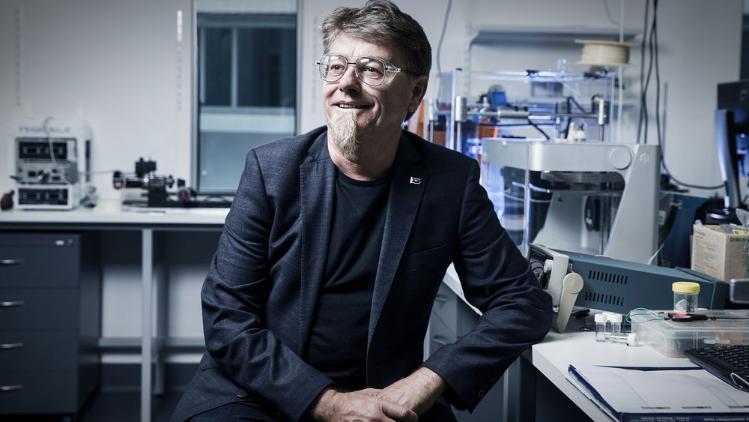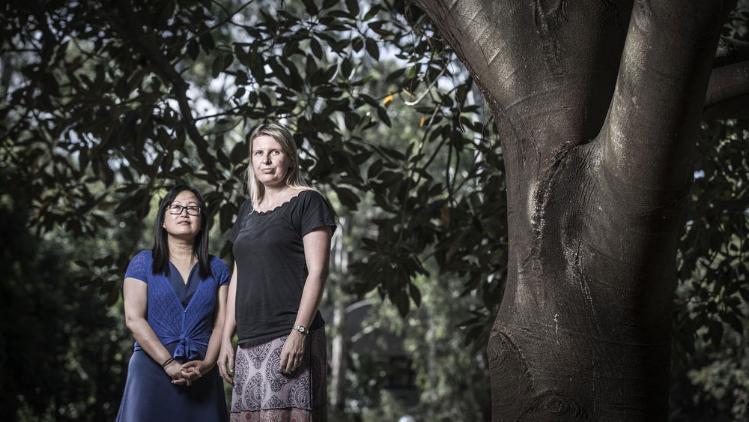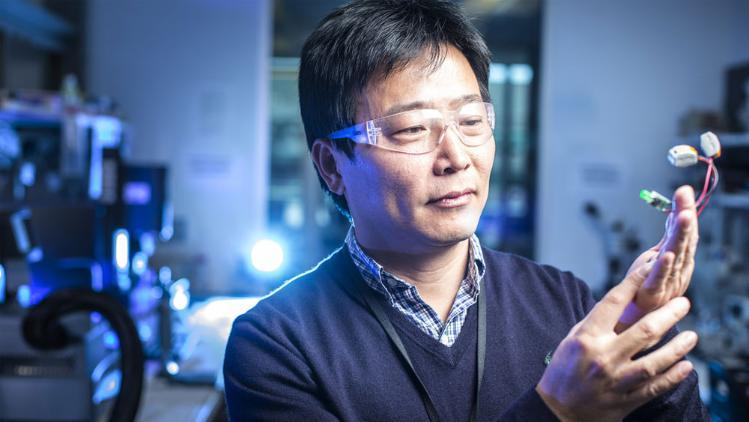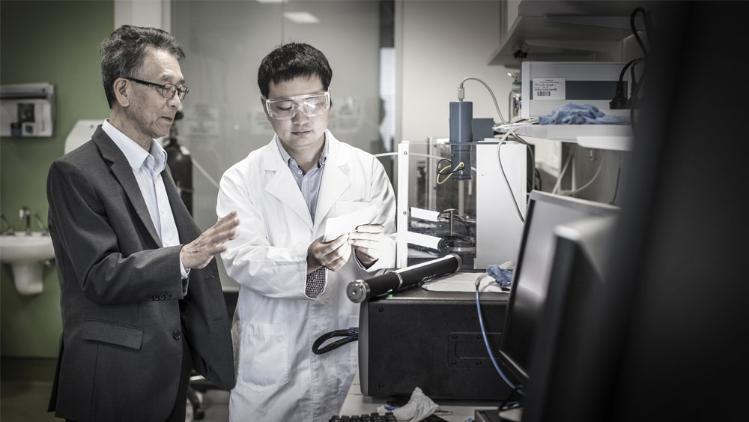ISI Highly Cited Researchers list, published by Clarivate Analytics, recognises global research leaders in the sciences and social sciences. The list is determined by those researchers who rank in the top 1 per cent by citations, for their publication year and field, in the Web of Science database over a 10 year period. Seven UOW researchers featured on the 2019 Highly Cited Researchers list.
ISI highly cited
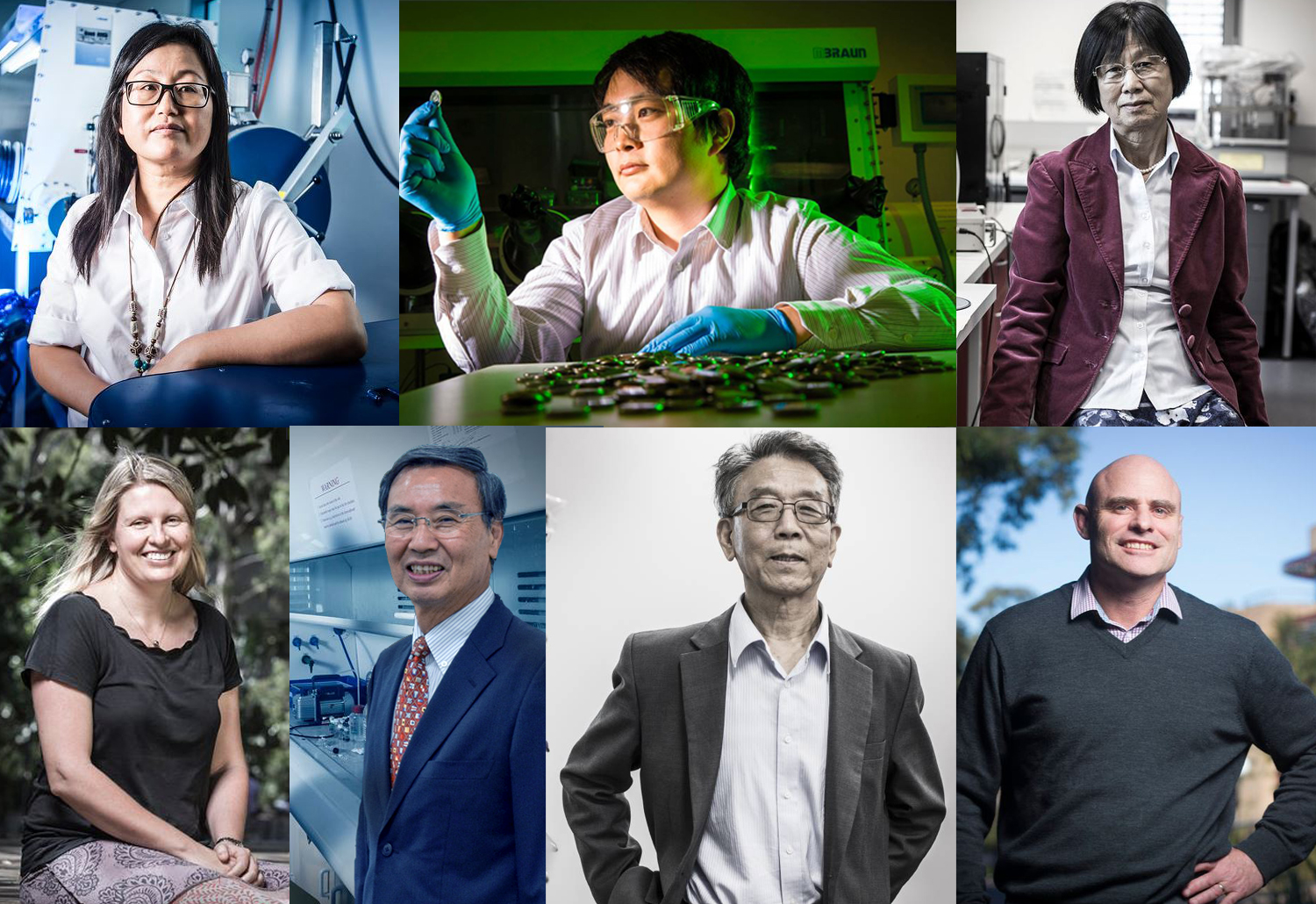
Australian Institute for Innovative Materials
Institute for Superconducting and Electronic Materials
Clarivate Analytics Highly Cited Researcher 2019 (Materials Science)
Distinguished Professor Shi Xue Dou has an outstanding track record in materials science and engineering research and leads a high performing academic team at the Institute for Superconducting and Electronic Materials. His breakthrough research focuses on superconductivity and energy storage materials, with his landmark work on materials design and fabrication of high performance capacity and functionality. The research has the potential to advance a range of applications including fault current limiters, next-generation MRI machines, electric vehicles and large scale energy storages for power grid and smart city. He received the Australian Government’s Centenary Medal for his contribution to materials science. Prof Dou has established industry links both within Australia and nationally, and oversees a number of current national grants including the $10.6 million Smart sodium storage system for renewable energy storage project investigating a single, low-cost, integrated solution for renewable energy generation, storage and management.
Distinguished Professor Hua Kun Liu
Australian Institute for Innovative Materials
Institute for Superconducting and Electronic Materials
Clarivate Analytics Highly Cited Researcher 2019 (Materials Science)
Distinguished Professor Hua Kun Liu has played a significant role in raising the profile of Australia’s research in energy materials. Prof Liu has overseen significant breakthroughs in the development of innovative technologies for a new generation of clean energy applications, in particular aimed at achieving high energy density, high power density and long cycle life lithium ion batteries for electric vehicles. As well as fundamental investigations into the electrochemical and physical properties of energy materials, Prof Liu has successfully commercialised a number of innovations, applied in industry, from her laboratory. At the Institute for Superconducting and Electronic Materials, she leads the high performing Energy Storage Materials research group that regularly publish in high impact, refereed international journals and over her career she has supervised over 75 doctoral candidates.
Professor Zaiping Guo
Australian Institute for Innovative Materials
Institute for Superconducting and Electronic Materials
Faculty of Engineering and Information Sciences
School of Mechanical, Materials & Mechatronics Engineering
Clarivate Analytics Highly Cited Researcher 2019 (Cross-Field)
Professor Zaiping Guo is a materials scientist with an interest in electrochemistry and nanotechnology and with an exceptional track record in her field of study, focused on the applications of nanomaterials in energy storage and conversion technologies, such as batteries. Her particular interest is in identifying the practical physical and chemical properties of these nanomaterials that can be used to improve overall performance of energy storage devices. For example, Prof Guo leads a research team that partners with a leading Chinese battery manufacturer – Tianneng Battery Group – to develop next-generation high energy density Lithium-ion batteries. This research, which is investigating silicon/carbon anode materials in place of existing graphite-based anodes, has the potential to significantly enhance electric car technology. This research is funded by an Australian Research Council Linkage Project; Prof Guo is also a current ARC Future Fellow.
Associate Professor Shulei Chou
Australian Institute for Innovative Materials
Institute for Superconducting and Electronic Materials
Clarivate Analytics Highly Cited Researcher 2019 (Cross-Field)
Associate Professor Shulei Chou is an established materials scientist interested in the development of new and improved lithium-ion (Li) batteries. In this area he has worked on a number of projects, including with industry partners, to analyse and elevate the performance of Li batteries in applications including in respirators used by workers in challenging environments. A/Prof Chou is also key member of the ‘Smart sodium storage system for renewable energy storage’ project at UOW, which is investigating, developing and applying an approach using sodium in batteries to overcome the limitations of lithium-ion technology, which include short life and high cost. A/Prof Chou’s track record includes being awarded the Scopus Young Researcher Award for Engineering and Technology, and he has published 160 journal papers in high-impact factor journals including Science, Nature Communications and Journal of the American Chemical Society.
Professor Yoshio Bando
Australian Institute for Innovative Materials
Institute for Superconducting and Electronic Materials
Clarivate Analytics Highly Cited Researcher 2019 (Materials Science)
Professor Yoshio Bando works at the cutting edge of materials science, concentrating on the synthesis of novel, inorganic one-dimensional nanostructures and their in-situ Transmission Electron Microscope analysis. Prof Bando holds a fractional appointment at the Institute for Superconducting and Electronic Materials at UOW, and is based at Japan’s National Institute for Materials Science (NIMS).
Professor Zenobia Jacobs
Faculty of Science, Medicine and Health
> School of Earth and Environmental Sciences
> Centre for Archaeological Science
> ARC Centre of Excellence for Australian Biodiversity and Heritage
Clarivate Analytics Highly Cited Researcher 2019 (Social Sciences, general)
A pioneer of technical developments in the dating of sand at geological and archaeological sites, Professor Zenobia Jacobs work is helping to uncover the evolutionary history Homo sapiens and their ancestors’ dispersal around the globe. Prof Jacobs’ method of optically stimulated luminescence (OSL) dating of sand grains is considered international gold standard. Her scholarly contributions include chronologies of unprecedented resolution for archaeological sites in Africa, which provided insight into the timing and likely causes of stone-age innovations in Africa and dispersal of early modern humans into Asia. With a current Australian Research Council Future Fellowship, Prof Jacobs is constructing a timescale of Neanderthal, Denivosan and Homo sapien existence – and potentially interaction – at an archaeological site in Siberia. Prof Jacobs is also a Chief Investigator on the ARC Centre of Excellence for Australian Biodiversity and Heritage (CABAH).
Senior Professor Tony Okely
Early Start
Faculty of the Arts, Social Sciences and Humanities
Clarivate Analytics Highly Cited Researcher 2019 (Cross-Field)
Senior Professor Tony Okely, Director of Research at Early Start in the Faculty of the Arts, Social Sciences and Humanities, makes his first appearance on the list. His research focuses on movement behaviours (physical activity, sedentary behaviour, and sleep) in children. Professor Okely led the research team that developed and recently updated the Australian 24-hr Movement Guidelines for Children 0-5 years, and the Australian 24-hr Movement Guidelines for Children and Young People. He was also part of the Guideline Development Group for the WHO guidelines on physical activity, sedentary and sleep behaviours in children under 5 years of age, South African 24-hr Movement Guidelines for Birth to 5 Years, and UK Physical Activity Guidelines for Children under 5.
Previous recipients
Professor Yoshio Bando
Australian Institute for Innovative Materials
Institute for Superconducting and Electronic Materials
Clarivate Analytics Highly Cited Researcher 2018 (Materials Science)
Professor Yoshio Bando works at the cutting edge of materials science, concentrating on the synthesis of novel, inorganic one-dimensional nanostructures and their in-situ Transmission Electron Microscope analysis. Prof Bando holds a fractional appointment at the Institute for Superconducting and Electronic Materials at UOW, and is based at Japan’s National Institute for Materials Science (NIMS).
Professor Jun Chen
Australian Institute for Innovative Materials
Intelligent Polymer Research Institute
ARC Centre of Excellence for Electromaterials Science
Clarivate Analytics Highly Cited Researcher 2018 (Cross-Field)
Professor Jun Chen focuses his research lens on Electroactive Interfaces, in particular on developing novel ‘Electro-/Bio- Interfaces, and 2D/3D Soft Architectures’ for use in applications such as sustainable energy devices/systems, wearable electronic chips, and increasingly, bionic devices. For example, Prof Chen is investigating emerging technology which could help to exploit the human body as a future sustainable energy source that is capable of powering personal Electronic-skin (E-skin) devices, for home health care and remote diagnosis. He and his research team aim to develop a ground-breaking design of wearable thermal E-skins capable of harvesting the body’s heat to use to continually power the micro-sensors and circuits in E-skins devices. Prof Chen has published over 180 journal papers, edited 8 books, and been co-inventor on 9 patents.
Associate Professor Shulei Chou
Australian Institute for Innovative Materials
Institute for Superconducting and Electronic Materials
Clarivate Analytics Highly Cited Researcher 2018 (Cross-Field)
Associate Professor Shulei Chou is an established materials scientist interested in the development of new and improved lithium-ion (Li) batteries. In this area he has worked on a number of projects, including with industry partners, to analyse and elevate the performance of Li batteries in applications including in respirators used by workers in challenging environments. A/Prof Chou is also key member of the ‘Smart sodium storage system for renewable energy storage’ project at UOW, which is investigating, developing and applying an approach using sodium in batteries to overcome the limitations of lithium-ion technology, which include short life and high cost. A/Prof Chou’s track record includes being awarded the Scopus Young Researcher Award for Engineering and Technology, and he has published 160 journal papers in high-impact factor journals including Science, Nature Communications and Journal of the American Chemical Society.
Distinguished Professor Shi Xue Dou
Australian Institute for Innovative Materials
Institute for Superconducting and Electronic Materials
Clarivate Analytics Highly Cited Researcher 2018 (Materials Science)
Distinguished Professor Shi Xue Dou has an outstanding track record in materials science and engineering research and leads a high performing academic team at the Institute for Superconducting and Electronic Materials. His breakthrough research focuses on superconductivity and energy storage materials, with his landmark work on materials design and fabrication of high performance capacity and functionality. The research has the potential to advance a range of applications including fault current limiters, next-generation MRI machines, electric vehicles and large scale energy storages for power grid and smart city. He received the Australian Government’s Centenary Medal for his contribution to materials science. Prof Dou has established industry links both within Australia and nationally, and oversees a number of current national grants including the $10.6 million Smart sodium storage system for renewable energy storage project investigating a single, low-cost, integrated solution for renewable energy generation, storage and management.
Professor Zaiping Guo
Australian Institute for Innovative Materials
Institute for Superconducting and Electronic Materials
Faculty of Engineering and Information Sciences
School of Mechanical, Materials & Mechatronics Engineering
Clarivate Analytics Highly Cited Researcher 2018 (Cross-Field)
Professor Zaiping Guo is a materials scientist with an interest in electrochemistry and nanotechnology and with an exceptional track record in her field of study, focused on the applications of nanomaterials in energy storage and conversion technologies, such as batteries. Her particular interest is in identifying the practical physical and chemical properties of these nanomaterials that can be used to improve overall performance of energy storage devices. For example, Prof Guo leads a research team that partners with a leading Chinese battery manufacturer – Tianneng Battery Group – to develop next-generation high energy density Lithium-ion batteries. This research, which is investigating silicon/carbon anode materials in place of existing graphite-based anodes, has the potential to significantly enhance electric car technology. This research is funded by an Australian Research Council Linkage Project; Prof Guo is also a current ARC Future Fellow.
Professor Zenobia Jacobs
Faculty of Science, Medicine and Health
> School of Earth and Environmental Sciences
> Centre for Archaeological Science
> ARC Centre of Excellence for Australian Biodiversity and Heritage
Clarivate Analytics Highly Cited Researcher 2018 (Social Sciences, general)
A pioneer of technical developments in the dating of sand at geological and archaeological sites, Professor Zenobia Jacobs work is helping to uncover the evolutionary history Homo sapiens and their ancestors’ dispersal around the globe. Prof Jacobs’ method of optically stimulated luminescence (OSL) dating of sand grains is considered international gold standard. Her scholarly contributions include chronologies of unprecedented resolution for archaeological sites in Africa, which provided insight into the timing and likely causes of stone-age innovations in Africa and dispersal of early modern humans into Asia. With a current Australian Research Council Future Fellowship, Prof Jacobs is constructing a timescale of Neanderthal, Denivosan and Homo sapien existence – and potentially interaction – at an archaeological site in Siberia. Prof Jacobs is also a Chief Investigator on the ARC Centre of Excellence for Australian Biodiversity and Heritage (CABAH).
Distinguished Professor Hua Kun Liu
Australian Institute for Innovative Materials
Institute for Superconducting and Electronic Materials
Clarivate Analytics Highly Cited Researcher 2018 (Materials Science)
Clarivate Analytics Highly Cited Researcher 2018 (Chemistry)
Distinguished Professor Hua Kun Liu has played a significant role in raising the profile of Australia’s research in energy materials. Prof Liu has overseen significant breakthroughs in the development of innovative technologies for a new generation of clean energy applications, in particular aimed at achieving high energy density, high power density and long cycle life lithium ion batteries for electric vehicles. As well as fundamental investigations into the electrochemical and physical properties of energy materials, Prof Liu has successfully commercialised a number of innovations, applied in industry, from her laboratory. At the Institute for Superconducting and Electronic Materials, she leads the high performing Energy Storage Materials research group that regularly publish in high impact, refereed international journals and over her career she has supervised over 75 doctoral candidates.
Distinguished Professor Richard ‘Bert’ Roberts
Faculty of Science, Medicine and Health
ARC Centre of Excellence for Australian Biodiversity and Heritage
Centre for Archaeological Science
Clarivate Analytics Highly Cited Researcher 2018 (Social Sciences, general)
Australian Laureate Fellow and Distinguished Professor Richard ‘Bert’ Roberts is an internationally renowned geochronologist and archaeological scientist, with research interests that span the fields of geology, ecology and archaeology. He leads a team dedicated to the dating of archaeological sediments, the chemical analysis of archaeological residues, and the reconstruction of past environments and human interactions. His projects have shed new light on the initial human occupation of Australia, the subsequent mass extinction of the megafauna, and the life and times of a new species of human discovered in Flores, Indonesia, in 2003. Prof Roberts has pioneered the development of optically stimulated luminescence (OSL) dating methods and statistical models to more accurately date key events in Earth’s history, focusing on the application of single-grain methods to archaeological deposits. Prof Roberts is Director of the ARC Centre of Excellence for Australian Biodiversity and Heritage (CABAH), a transdisciplinary and multi-institutional research collaboration that is transforming our knowledge of the region’s human and environmental history and will help inform the management of our natural and cultural resources into the future.
Distinguished Professor Gordon Wallace AO
Australian Institute for Innovative Materials
Intelligent Polymer Research Institute
ARC Centre of Excellence for Electromaterials Science
Clarivate Analytics Highly Cited Researcher 2018 (Cross-Field)
Distinguished Professor Gordon Wallace, an esteemed innovator and educator, is a scientist at the forefront of health technologies, where medical devices complement the body’s own systems to treat disease and repair injuries. An example of this is the ‘Biopen’, used by surgeons to directly print healing cells into a patient’s body during procedures, like knee surgery. With research interests in organic conductors, nanomaterials and electrochemical probe methods of analysis in intelligent polymer systems, his extensive scientific contributions has broken new ground in every aspect of electromaterials research; academic performance and outcomes, training the next generation of researchers, and facilities development. These contributions to the enhancement of Australian materials research has led to a number of high accolades including being awarded an ARC Laureate Fellowship (2011) and the Eureka prize for leadership in Innovation and Science (2016), being named NSW Scientist of the Year (2017), and appointed an Officer in the General Division of the Order of Australia (2017). Professor Wallace is Executive Research Director of the Australian Research Council (ARC) Centre of Excellence for Electromaterials Science based at UOW; Director of UOW’s Intelligent Polymer Research Institute; and Director of the Australian National Fabrication Facility – Materials Node.
Professor Jiazhao Wang
Australian Institute for Innovative Materials
Institute for Superconducting and Electronic Materials
Clarivate Analytics Highly Cited Researcher 2018 (Materials Science)
A focused interest in materials and fabrication for better performing batteries underpins the research of Professor Jiazhao Wang. A member of the battery projects for renewable energy storage at the Institute for Superconducting and Electronic Materials, Prof Wang is focused on development of novel materials for lithium-ion batteries and sodium-ion batteries, lithium-sulfur batteries, metal-air batteries, including Li-air, Na-air and Zn-air batteries. The importance and quality of Prof Wang’s research is reinforced by her success in attracting nationally competitive funding. She has successfully applied for six competitive Australian Research Council (ARC) funded projects as a team leader. She is currently a team leader on an ARC Discovery Project and an ARC Linkage Project.
